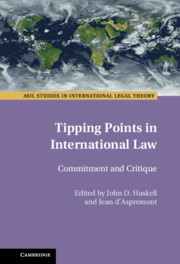Book contents
- Tipping Points in International Law
- ASIL Studies in International Legal Theory
- Tipping Points in International Law
- Copyright page
- Contents
- Contributors
- Acknowledgments
- 1 Experiencing Tipping Points in International Law
- 2 The Literary Performances of the Tipping Point
- 3 Authoritarianism
- 4 China
- 5 Democracy
- 6 Development
- 7 Digital
- 8 Environment
- 9 Health
- 10 Human Rights
- 11 Labor
- 12 Liberation
- 13 Multilateralism
- 14 Race
- 15 Religion
- 16 Rule of Law
- 17 Russia
- 18 Systems
- 19 Territory
- 20 United Nations
- 21 Universalism
- Index
2 - The Literary Performances of the Tipping Point
Published online by Cambridge University Press: 23 October 2021
- Tipping Points in International Law
- ASIL Studies in International Legal Theory
- Tipping Points in International Law
- Copyright page
- Contents
- Contributors
- Acknowledgments
- 1 Experiencing Tipping Points in International Law
- 2 The Literary Performances of the Tipping Point
- 3 Authoritarianism
- 4 China
- 5 Democracy
- 6 Development
- 7 Digital
- 8 Environment
- 9 Health
- 10 Human Rights
- 11 Labor
- 12 Liberation
- 13 Multilateralism
- 14 Race
- 15 Religion
- 16 Rule of Law
- 17 Russia
- 18 Systems
- 19 Territory
- 20 United Nations
- 21 Universalism
- Index
Summary
Using the notion of tipping point (hereafter ‘the tipping point’) to reflect on the dialectics at work between commitment and critique in international legal thought and practice comes with a fundamental ambivalence. On the one hand, there can only be excitement for the resort to such a new symbolic universe out of which innovative arrangements – and possibly thoughts – can emerge. For sure, the tipping point can prove a terribly enabling tool for international lawyers, even more so since the editors of this book and authors of the following chapters are not bound by the meanings, uses and semantics which the tipping point had been filled with in other disciplines. On the other hand, the use of the tipping point as a central conceptual tool limits what can possibly be thought and said about the dialectics between commitment and critique in international legal thought and practice. After all, the words that compose our language always allocate us a position and constrain our imagination, experience and thinking.
- Type
- Chapter
- Information
- Tipping Points in International LawCommitment and Critique, pp. 26 - 36Publisher: Cambridge University PressPrint publication year: 2021

